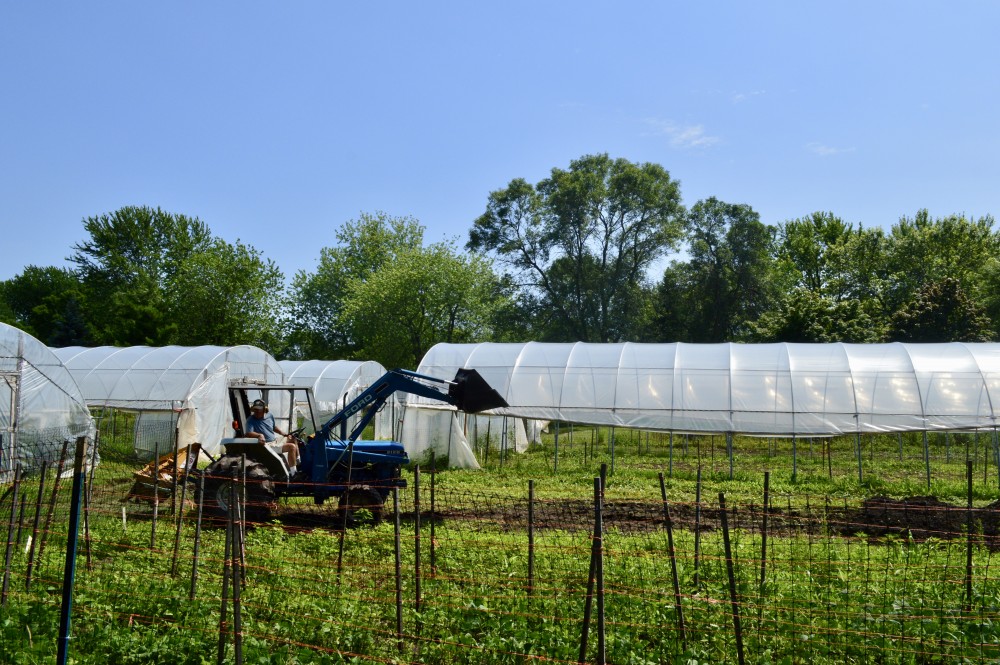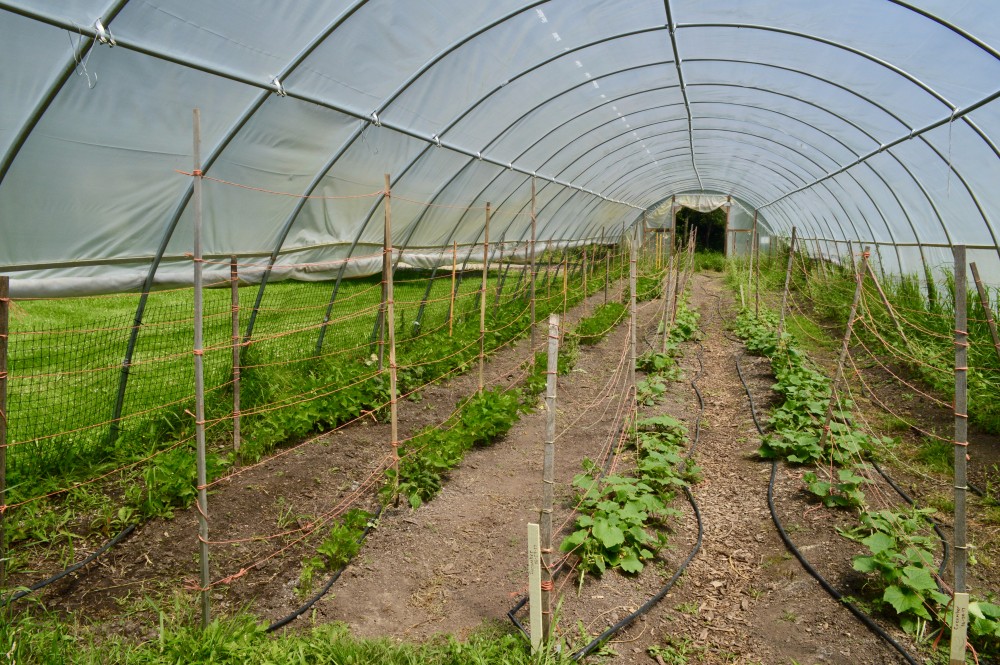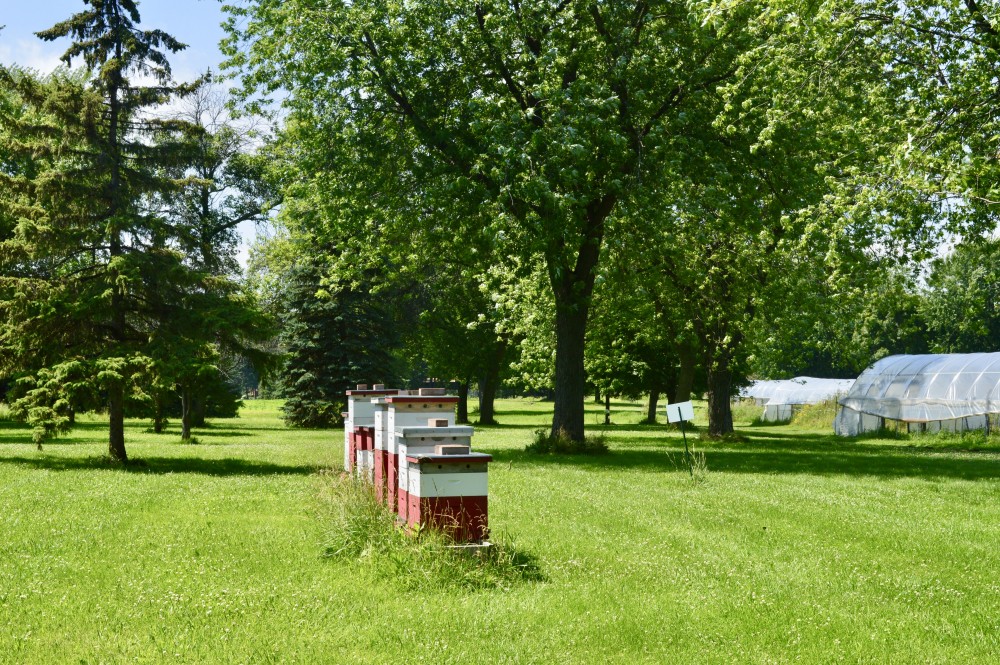What does the Fox say? Farming in the urban/rural divide
The Fox Valley is a place where worlds collide. Here, massive tractors roll at a creeping pace through high school homecoming parades. Here, downtowns flurry with the traffic and energy of cities twice their size. Here, too, 72 acres of old golf course and country club have been converted into a non-profit that farms produce within Appleton’s city limits: Riverview Gardens.
“This area’s called an ‘urban farm,’ but we often say we grow volunteers first and vegetables second, because at the end of the day, I’m training individuals in transferrable skills through vegetables, or through farming,” says Director of Land Management Rachel Van Daalwyk. “I can have the greatest impact at this point through vegetables versus running this as a golf course.”

The man driving this tractor is well-known around Riverview Gardens. Raised on a dairy farm, he knows the lay of the land, and of the farming field.
Re-founded in December 2011 as Riverview Gardens, the grounds were once Riverview Country Club, Wisconsin’s then-oldest private country club. Once a symbol of class differences, today the emerald acres aim to address systemic barriers in poverty, unemployment and homelessness.
Director of Resource Management Kelly Nutty wears many hats at the Gardens, up to community outreach, but not including farming. “I’m not a farmer; there’s so much more to farming than what I thought farming was,” she says. “It’s a business. It’s not just seeds and dirt, although it is a lot of seeds and dirt. It’s all the things that make those seeds and dirt possible.”
The farming itself is intended for the roughly 250 graduates of Riverview’s job-training program, ServiceWorks. The program consists of three years worth of leadership development, personal empowerment, and job placement and progression. Although ServiceWorks began at COTS homeless shelter, today it serves those living in poverty, veterans, young adults leaving foster care, single parents, and those leaving incarceration.
“They’re all coming to get their hands in the ground and to interact, but we’re the meeting place,” says Van Daalwyk. “A lot of tasks within farming can sometimes be monotonous and [menial,] but there’s conversations that go beyond weeding and planting and harvesting. That’s what we’re trying to foster.”
The golf cart-wide aisles between 20 translucent “hoop houses” (metal hoops covered with greenhouse plastic) and furrowed brown earth grow much more than ground cherries and cherry tomatoes. The planting, weeding and harvesting work cultivates its own social bonds: everyone who interacts with the property is welcome to daily lunches cooked up with the Gardens’ veggies.

“Hoop houses” like these provide the extra protection young plants need to grow. An additional layer of plastic in the spring allows for the early planting of some crops.
Taking breaks and engaging in activities outside of the green sanctuary creates room for human connection. “Everyone we engage with on our job training program, they have a lot of different barriers. The chord that strikes throughout all of them is that, in their world, they’re isolated,” says Nutty. “So we’ve created this community within a community, and we have this unlimited work.”
With over 750 gardeners enrolled, upwards of 10,000 volunteers total, and a 71 percent success rate in its ServiceWorks program, Riverview Gardens has its work cut out for it. At the same time, though, it provides fertile soil for an endless cycle of the work it provides — this is a year-round operation with a mission.
“I’m offering them a skillset that is at it’s simplest base is personal responsibility, but it has a layer of basic agricultural education: plants, propagation, cultivation,” says Van Daalwyk. “But the end result isn’t an individual who is going to go and be a dairy farmer or a vegetable farmer.”

Aside from the vegetables it concentrates on – and the occasional sunflower – Riverview also raises bees. While much of the honey keeps the bees nourished throughout the winter, over 100 pounds was harvested last year.
The Fox Valley’s crossroads of rural and urban yield the unique responsibility felt by its people, particularly its farmers. Russ Lichtenburg grows crops part-time as a cash grain farmer and works as a welder at Oshkosh Truck the rest of the time. His sense of accountability has its roots in his farm fields and the tractor he used to fall asleep in with his father.
“I started doing it when I was a kid, so you learn responsibility as a child growing up taking care of animals; if you don’t take care of them, they die,” he says. “When I took over on my own, you own everything, you make all the decisions financially, and it’s a lot of responsibility, a lot of pressure, but it’s fun too.”
Farming, he says, runs in his blood. He took over the farm from his father, and given the chance, would welcome his own kids onto the land with an open heart. The agriculture that pervades the region sprouts personal responsibility, but it has much more to offer in the vein of instilling values and stirring change.
“We engage our participants, but we also have tons of community volunteers who want to get involved with us,” says Nutty. “Retired folks in our community, young millennials, corporate groups, civic groups all engage with us and want to work side-by-side with the people we serve, and that’s what changes perceptions and removes barriers.”
Barriers still arise, however, in the perception of farming between age groups. At Riverview Gardens, this summer ushered in a focus on the youth core, or the youth ServiceWorks, from honors students to those doing community service. Yet beyond the carefully constructed “urban farm,” Lichtenburg perceives cultural differences between generations.
“Depends on the person: generally middle-aged to older people are more inclined to think that it’s really cool and that it’s a good thing and everything,” he says. “Probably the younger people when they find out would be like, ‘Why? Why waste your time and your money?’”
As much a pillar of Wisconsin life as the Packers or Camp Randall, farming may not seem as glamorous to the youth of the Dairy State. But whether they realize and respect it or not, the fields of crops between towns and – as far as Riverview Gardens goes – within them, make the Fox Valley the place they call home.










Leave a Comment